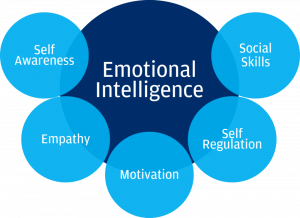What is Emotional Intelligence?
Emotional Intelligence simply put describes the ability to be aware of one’s emotions and regulate them effectively. Beyond oneself, it also describes the ability to be aware of, assess, manage the emotions of others, build stronger relationships, and regulate these emotions to promote personal growth. By the age of 4, most children already learn to find ways to eliminate unpleasant stimuli. For example, they may cover their eyes when they are scared or put their hands over their ears when there is a loud sound. With practice and careful guidance, they develop and improve their capacity for emotional self regulation.
 The components of Emotional Intelligence (EI) include:
The components of Emotional Intelligence (EI) include:
- Self- Awareness: Describes your ability to identify and manage core feelings such as joy, fear, anger, etc. If as an infant your parents or caregiver understood and valued your emotions, then it is highly likely that as an adult, you embrace your emotions, connect, and understand how your emotions influence your thoughts and actions.
- Self- Management: Describes the ability to make constructive decisions about one’s behaviour, despite feelings of impulsiveness and emotional stress. Being able to follow through on commitments, adapt to changing circumstances in the face of emotional stress that takes us out of our comfort zone.
- Social Awareness- The ability to look beyond yourself and see the emotional cues others are constantly communicating. This helps you know how they feel and how to respond appropriately.
- Relationship Management- Because you can recognize and understand what other people are experiencing, you are better able to cultivate and nurture relationships.
It was earlier thought that the most important factor required for academic success is the Intelligent Quotient, however it can be argued that Emotional Intelligence is equally as important because students who are aware of their own feelings, can recognise and respond to the feelings of others can handle the intensity and frustrations that may come with learning better. They may also be less impulsive and handle life’s transitions better.
Why Is Emotional Intelligence Important? 
Emotional Intelligence has been shown to be a strong predictor of success, as we all know sometimes it is not the most intelligent person in a class that makes the most impact in life. Parenting styles that dismiss or disapprove a child’s feelings are not helpful either. Children whose parents have taught them to see emotions as a sign of weakness, unimportant, or as something to be squashed, go to school but are not able to foster healthy relationships. Nobody wants to play with a child who does not share toys, says mean things when upset, cannot calm themselves does when experiencing intense emotions such as anger or calls other children ‘chickens’ for showing emotion.
 Some parents may recognize their child’s emotions, but they do nothing to address them, while yet another set of parents would ‘emotion coach’ their children. They value negative emotion, are not judgemental or impatient with a child’s emotional expression and use the opportunity to guide them by helping them to label the emotions and solve the issues at hand.
Some parents may recognize their child’s emotions, but they do nothing to address them, while yet another set of parents would ‘emotion coach’ their children. They value negative emotion, are not judgemental or impatient with a child’s emotional expression and use the opportunity to guide them by helping them to label the emotions and solve the issues at hand.
Children of parents who value emotions and emotion coach them tend to do better in school and get along better with their friends. Children with high EI may perform better at standardized tests, manage conflicts better, foster deeper friendships, and are less likely to experience depression.
Emotional Intelligence helps to navigate social complexities at school, manage stress better (yes, children feel stress too because they are human), nurture healthy friendships, communicate effectively. An emotionally intelligent child is ‘present’, feels loved, and is better connected with themselves and the world around them.
Factors That Affect A Child’s Emotional Intelligence/Awareness. 
- Objective emotional link between parents and children and how these children perceive or interpret the emotional link- these are two vastly different things. Parents may say they are warm, aware of their child’s emotions but as an adult, the child looks back and makes a subjective assessment that shows his/her emotional needs were not met.
- Subjective perception of the family’s financial status
- Culture and beliefs unique to a family unit.
- Parenting style
- Low socioeconomic status, unhealthy community
- Maternal depression
- Developmental delay, etc.
How To Nurture Emotional In Your Child.
 It starts with your own self awareness. Be aware of your own emotions as a parent and be willing to model emotional awareness, intelligence, and maturity in your home. When children first start school or childcare center, they may not have the vocabulary to express themselves adequately in the classroom or on the playground. So, they would rely on the emotional literacy taught or otherwise by their parents and care givers.
It starts with your own self awareness. Be aware of your own emotions as a parent and be willing to model emotional awareness, intelligence, and maturity in your home. When children first start school or childcare center, they may not have the vocabulary to express themselves adequately in the classroom or on the playground. So, they would rely on the emotional literacy taught or otherwise by their parents and care givers.
Your child’s emotions are not an inconvenience and while you might be tempted to ask them to ‘suck it up!’ or say things like ‘a boy does not cry!’ please bite your tongue and take that moment as an opportunity to connect with the child, help them represent what they feel with words instead of acting out, and guide them through it.
Listen to the content of your child’s emotional expressions or outburst and yes it might get on your last nerve especially on a particularly difficult day, but it would give you an insight to how they really feel. As you listen, give them your full attention, get down to their eye-level, help your child see that you understand what they feel.
Help them develop the right vocabulary to express what they feel. Story telling is an excellent way to do this, whether they read the stories themselves or you read it to them, role play with dolls and dramatic play as well. This would help them process and relate to different situations, events and learn to handle them more effectively. Set limits for appropriate behaviour, validate their feelings but help them understand that not all behaviours are acceptable.

Dr Omowunmi H. Thanni is a physician with a medical degree from Olabisi Onabanjo University Ago-Iwoye (Mb.ChB. Ogun). She is an Infant and Childhood Mental Health enthusiast who is passionate about supporting children with mental health concerns.
She is also an Early Childcare practitioner with experience observing children dealing with grief, the various psychosocial presentations, and the impact on their families. She is also a Child and Family Volunteer who serves as a healthy support system for children and families who have experienced the loss of one or both parents to terminal illnesses.
She is devoted to debunking cultural myths surrounding childhood mental health and enlightening the community on proper prevention and intervention strategies.

